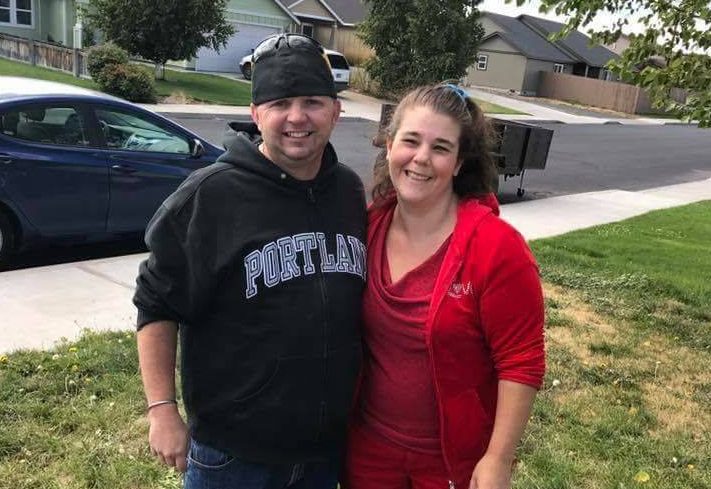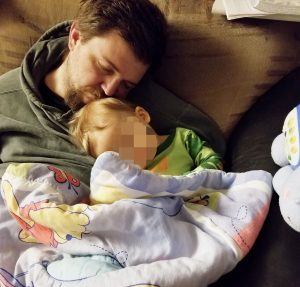Last month, the Oregon Department of Human Services deployed three lawyers to call 40 witnesses over 11 days in a desperate attempt to keep one child in foster care. They had confiscated the child, at birth, from Amy Fabbrini and Eric Ziegler. Fortunately, they failed. After ten months in foster care, the child was returned to his parents. But DHS will be back in court this month trying to terminate Fabbrini and Ziegler’s parental rights to their other child, who has been in foster care for four years.
Oregon DHS is an agency where people constantly whine about how overworked and underfunded they are. So surely any couple who would bring so much legal firepower down upon them must have done horrible things to their children. But what? Did they beat them? Torture them? Try to sell them on the street for drugs?
No.
In fact the parents never abused or neglected their children at all.
The legal assault on this couple initially was based on the fact that Ziegler’s IQ is 66 and Fabbrini’s is 72. (The average is between 90 and 110.) That may be illegal – a violation of the federal Americans with Disabilities Act. The Departments of Justice and Health and Human Services drew that conclusion in a scathing letter to the state of Massachusetts when it tried to pull the same stunt in a remarkably similar case. (DHS’ behavior also probably violates the “reasonable efforts” requirement in federal child welfare law, but almost no one in child welfare pays attention to that.)
It certainly should be illegal. As Susan Yuan, former associate director of the Center on Disability and Community Inclusion at the University of Vermont told Samantha Swindler, a columnist for the Oregonian who first wrote about the case, “Research literature has found that the IQ really doesn’t correlate with parenting until the IQ is below 50.”
I say IQ was initially the reason because I believe the hostility to the family escalated after the couple went public, speaking first to Swindler, then to the television program Inside Edition. That prompted a DHS spokeswoman to complain that “This family has been very public about this case. We have to protect the privacy of those children.”
Translating from child welfare-speak to plain English, that really means: Now that they’ve gone public it will be really, really humiliating for us here at DHS if we lose — especially since, in Oregon, court hearings in these cases are open and everyone will be able to see what we’ve done to this family.
In fact, it’s likely that the only way the family stood a chance was to go public. But I think that’s why the Oregon Department of Human Services is trying so hard to Make. Them. Pay. Indeed, this is not the first time Oregon DHS has gone to great lengths to seek vengeance against a family that made the agency look bad.
A litany of non-horrors
Because these hearings are open in Oregon, Swindler could cover the court hearing where Judge Bethany Flint returned the younger child, Hunter, to the parents.
Over the course of 11 days Judge Flint heard a litany of non-horrors about the parents: They had to be told to put sunscreen on the baby’s arms, not just his face! Their home “smelled of dog”! They chose the wrong snacks for the child!
And, at a time when thousands of people lose their children to foster care because their housing is too bad, DHS argued that this couple’s housing was, in effect, too good. As Swindler reported:
At one point [a lawyer for DHS] argued the couple’s housing permanency – they live in a house with the mortgage paid by Ziegler’s parents – was a sign of deficiency. “Going through the rental and purchasing processes show a level of functioning and a level of ability that would be important to look at,” she said.
Fortunately, Judge Flint understood exactly what was really going on – at least up to a point. Again from Swindler’s story, quoting the judge:
“I searched and searched [in DHS’ case] for some sort of language that was provided to articulate what the current threat of harm is to Hunter right now. … There is no allegation that they’re not able to meet his basic needs. …
“I found it difficult to read that these parents tried this thing and tried that thing and then they are advised that instead of chicken nuggets they should have boiled chicken breast, that giving fried foods is a parenting deficiency. …
At times, the state argued that Fabbrini and Ziegler asked too many questions, suggesting they didn’t know how to parent. At other times, the state implied they didn’t ask enough questions, trying to show they didn’t understand their cognitive limitations.
“They can’t win for losing,” Flint said. “I think there’s a lot of evidence in the record that whenever they do say things they are attacked for them, which could create a culture of silence around the parents as well.”
The DHS visit supervisor supports the parents
The judge’s view jibes with that of a neutral outside observer who spent a lot of time with the family. Sherrene Hagenbach is a professional mediator and a member of the Board of Advisers for Healthy Families of the High Desert, a home visiting program for new mothers. She’s also a volunteer visit supervisor for DHS – or rather she was. Before Hunter was born, she was assigned to supervise visits between the parents and their older son, Christopher. But after she testified in court in favor of the parents, she says her supervisor said her services no longer were needed.
Now she volunteers her time as an advocate for the family. On a fundraising page for them (which is well worth reading in full) she wrote:
“In my professional opinion, after multiple sessions observing Amy and Eric interact with their son for hours on end, I found no reason they should have had their child taken from them and placed in the State’s care. … I would also add that it was apparent from their body language and how they treated each other that the couple was in love, and while that is not a requirement to be a parent, it’s a big bonus for a child.
Hagenbach writes that when Hunter was born she offered to take in the entire family – the infant and her parents – and supervise them around the clock. She says a judge ordered DHS to do a background check in preparation for that placement. Somehow DHS never got around to it, and the placement never happened. Hunter was placed with strangers.
The real issue is poverty
In an interview with Swindler, Hagenbach revealed that the real issue went beyond I.Q. Once again, a child protective services agency was after a family because it was poor:
They’re saying that this foster care provider is better for the child because she can provide more financially, provide better education, things like that. If we’re going to get on that train, Bill Gates should take my children. There’s always somebody better than us, so it’s a very dangerous position to be in.”
The parents jumped through every hoop DHS put in their way. They took courses in parenting, CPR, first aid and nutrition – probably leaving them better qualified to meet their children’s needs than many parents with higher IQs.
In addition, Hagenbach told Inside Edition, Ziegler was chosen for jury duty on a four-day case involving a housing dispute. “So he’s capable of deciding somebody else’s fate,” Hagenbach said, “and yet he can’t even raise his own child?”
The dangerous underlying assumption
Implicit is all of this is a common, and dangerous, assumption by child welfare agencies: In order to be allowed to have their children the people in our society who have the least must prove they can do something that nobody else does: raise their children with no help.
Even Judge Flint may have fallen into this trap. Though she returned Hunter to his parents, she expressed concerns about doing the same for the older child, Christopher, because he has developmental problems and the judge isn’t convinced that the parents fully understand those problems.
But if the parents were middle-class, they could hire whatever help they needed for the child. Middle-class parents are not expected to raise their children with no help.
Of course since they can’t necessarily afford to pay for the help on their own, that means taxpayers would foot the bill. But it would be a bargain.
An Oregon group that promotes adoption estimates that a year of foster care costs taxpayers at least $26,600. (Obviously not all of that is going to the foster parents, a lot of it goes to support the whole DHS foster care bureaucracy.) These children have been in foster care for a combined total of about five years. That’s $133,000 wasted – and counting, since the older child is still in foster care. Add to that the cost of all those lawyers, and the expert witnesses and the court time and, well, you get the idea.
You could buy a lot of parenting help for that kind of money.
Or as Swindler put it:
“No doubt, these parents will need outside help to face the challenges ahead. How much heartache could have been avoided if the state had opted to, say, provide a parenting aide to coach them rather than a case worker to criticize them?”
Oregon spends on child welfare at a rate more than 55 percent above the national average. That’s largely because it wastes so much money on needless foster care, taking away children at a rate 30 percent above the national average.
So the next time people in Oregon complains about how overworked the good folks at DHS are, ask them why DHS wasted so much time and talent needlessly tearing apart this family instead of providing them with help. And the next time they whine about how underfunded they are, ask them why they wasted so much money needlessly separating these children from their parents.
And one other question comes to mind: Wasting all that time and money and inflicting all that unnecessary trauma on a family isn’t very smart. Has anyone given the decision-makers at DHS an I.Q. test?
Editor’s Postscript:
In late September, 2012, the National Council on Disability released an important and extremely comprehensive report titled “Rocking the Cradle: Ensuring the Rights of Parents with Disabilities and Their Children.”
Parents with disabilities, wrote the authors of the 347-page encyclopedic accounting, “are the only distinct community of Americans who must struggle to retain custody of their children.”
The right to parent without interference is protected by the U.S. Constitution, the authors noted in the report’s cover letter addressed to then-President Obama. That constitutional right is, of course, ” balanced by the judicially recognized power of the state to interfere to protect the well-being of its children.”
Yet, despite the strides made since the 1990 passage of the Americans With Disabilities Act, or ADA, for parents with disabilities, according to the researchers, the factors used in both the nation’s dependency courts and family court proceedings to determine whether children need to become wards of the state, “are not objectively or justly applied.”.
To the contrary, parents with disabilities and their children “are overly, and often inappropriately, referred to child welfare services” and, once involved, the report found that the children of parents with disabilities are permanently separated from their kids at alarmingly disproportionate rates.
In detail, the report described state and local foster care systems that were “pervaded with bias.”
This bias was made far worse by state laws that very often “overtly discriminate against parents with disabilities,” or at best failed to protect parents “from unsupported allegations that they are unfit” solely based on their disabilities—in clear and egregious violation of the ADA.
In general, the researchers found a dispiriting “lack of expertise or even familiarity regarding parents with disabilities and their children.”
This lack of knowledge and expertise was particularly problematic when it came to parents with intellectual or psychiatric disabilities, according to the report. As a result, the authors wrote, removal rates where parents have a psychiatric disability were as high as 70 to 80 percent. And, where the parent has an intellectual disability, removals ranged from “40 percent to 80 percent.”
The report pointed to California as one of the few states that had made legislative strides in the direction of protecting parents with physical disabilities from discrimination with the passage of SB 1188, which was signed into law by Arnold Schwarzenegger in August 2010.
Yet, according to a 2017 policy review by Disability Rights California, protection from discrimination on the basis of “mental, psychiatric, or developmental disability” is still sadly lacking in the state.
In no community, the 2012 federal report concluded, is the welfare of children served “by breaking up families based on fear and stereotype.” Instead, if the nation is truly concerned about the welfare of children, as Richard Wexler suggests in his op-ed above, we would be best off, wrote the federal researchers, investing “more money and energy in preventive services for families rather than in parental rights termination and foster care.”
And yet, as of 2016, warns an NCD published “Know Your Rights” toolkit for parents with disabilities, 35 states still have discriminatory laws on the books that mean “if you had a disability, you could lose your right to be a parent, even if you didn’t hurt or ignore your child.”
Celeste Fremon
Richard Wexler is the executive director of the National Coalition for Child Protection Reform. This Op-Ed was first published on NCCPR’s Child Welfare blog.




Witness la, the target of the last Wexler smear job you published , Matt Rexroad answered in the comment section of that story and invited you to call him for his response. I know you guys aren’t into that whole “other side of the story” thing especially when it goes against your conformation bias, but did you ever get ahold of him? This Wexler character seems like he has an agenda. Seeing how this stuff involves the well being of kids maybe you guys can break your usual pattern and check with the other side of the story.
[…] Source: Witnessla […]